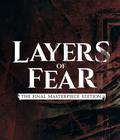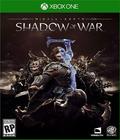Pre-order Middle-earth: Shadow of War
Middle-earth: Shadow of Mordor was a fantastic game that took elements from the Assassin's Creed and Batman: Arkham series and put it in the universe crafted by J. R. R. Tolkien. The result fit together nicely as a freeform game with plenty of content to digest even before the subsequent DLC was taken into account. It also stood out because of the Nemesis system, a game mechanic that has yet to be replicated by another title. The sequel, Middle-earth: Shadow of War, continues with what worked before, but it's fully developed for the current PC and console crop without the burden of also supporting the previous console platforms. We got something a little more ambitious and satisfying.
The story is set directly after the first title. Once again, you play as the undead ranger Talion and his body-sharing wraith companion Celebrimbor on a quest to eliminate Sauron and his minions. Their attention is turned to the city of Minas Ithil, which stores a powerful orb that can turn the tide of the war. The main tale has a number of twists and false finishes, but they're all enjoyable. To reach those good points, however, you need to get through a bunch of side stories that can feel like filler. They're good quests to undertake, but it's an issue that your wraith companion constantly reminds you to focus on the main task when you take on these missions.
The gameplay mechanics for several different areas remains unchanged from the first title. Like before, Talion starts off as an adept ranger, so he can scale almost any vertical surface and drop from great heights without fear. His wraith vision allows him to see enemies from afar or look for their tracks; this is particularly useful when tracking down a particular orc or Uruk-hai. He can practice the basics of stealth, like hiding in bushes or taking out enemies silently from any direction. His freeform combat means that he can easily take out a group of enemies, parry hits from enemies and sliding toward the next foe without necessarily having to aim.
Begin the leveling process, and Talion becomes even more effective. You can rocket up walls to climb faster. Taming wild beasts becomes easy enough that you can warp over and instantly get them to fight on your side. Flipping over enemies can freeze them and open them up to a flurry of attacks, or you can throw multiple daggers at once. You can extend the amount of slow-down time when aiming with your bow, or you can poison barrels from afar so orcs can drink the poisoned brew or you can blow up the container. You'll have more than enough points by the game's halfway point to get enough abilities that match your play style.
The only issue that arises from the combat system has to do with how the environment reacts to your moves. In open areas, your movement can be wide, but fighting near walls sometimes obstructs your vision because the object doesn't become transparent or the camera zooms in too close to you. When you fight near sizeable objects that are grouped together, you risk getting stuck in the environment. It impacts your strategy in that you'll tend to avoid fighting large mobs in confined spaces.
While the combat system is solid, it's the Nemesis system that impressed people the most. You can discover the orc captains in the area in a number of ways. You can find some by finding clues and then following their tracks with your wraith sight. You may stumble upon others as you traverse the land. Even then, the dynamics can quickly change as other orcs or humans become new threats or allies. There's also the option of interrogating a worm, which lets you choose to reveal a shadowy orc figure or gather more intel for a revealed enemy.
The orcs are randomly generated, so no two people will encounter the same ones in the same area (except for Bruz, who is part of the story proper). That means you may meet up with a bard, beast tamer, hunter or poet, who doles out unskippable introductions before engaging in a fight with you. Most of the intros are humorous, and you'll go through an assortment of them before the game repeats them. The fights are quite varied, as each orc has a distinct skill that changes the flow of the fight and your tactics. For example, one encounter may prevent you from flipping over the enemy since they can grab you and throw you down. Another may get a second chance at life once they die, and another can be impervious to arrow attacks.
Post-battle, a number of outcomes are available. An orc can run away, and if you don't hunt him down, he might come back later with a higher level and a different title. You can kill the captain, but they have a small chance of cheating death in interesting ways. One orc had his body parts stitched together while another came back with more metal keeping him intact. Should you die at the hands of an orc captain, they're stronger when you meet them again.
A new feature in Shadow of War is that killing the orc allows you to gain gear. As you would expect from games with loot, there are various levels of daggers, helmets, swords and the like that'll give you benefits like poison damage and stat increases. In lieu of gear, you can earn gems that augment abilities with bigger XP percentage gains, and the gems can also be crafted into more powerful ones. You can also shame the orc so they'll run away and seek revenge.
Much like the first game, you can sacrifice gear for the chance to sway some orcs to your side. You can get subdued orcs to fight at your side so you can even the odds or have an advantage. Otherwise, you can have them perform ambushes against other orcs. They can also be sent to kill orc captains, or they can be assigned to higher chieftains in the hopes that they'll betray them once you go into battle. You can even send them into duels so they can level up and get stronger — if they survive the battle.
The ability to have orcs by your side adds to the dynamic game mechanics. There's some satisfaction to having a bunch of orcs fight on your behalf so you can attend to other things. The idea that those same orcs can betray you at any moment keeps the game feeling fresh. It would've been nice to see immunity granted to orcs once they're fighting for you. Get into a brawl with human allies, and you can swing freely. Do the same with your orc brethren, and you'll always hit them. As such, you're forced to be on the defensive and only counter if you get into big tussles with them.
The act of obtaining orc captains leads to one of the game's big new additions: fortresses. Each of the five major areas has a fortress, and it's your job to take them over. Your player level at the time of your invasion determines how many orc captains you can have at your side, and your cache of coins determines whether you can have war beasts firing flaming bolts or fleets of shield-bearing soldiers fighting alongside you. Once the invasion begins, you have to breach the gates and take over the indicated control points while either killing the enemy orc captains or turning them to your side. Once the castle overlord is defeated, the place is yours.
If you're the one being invaded, the process is a little different. You can choose which orc you want to defend the place, and while the upgrades are more defense-oriented, like having a drake at the gates or upgrading to metal castle walls, they're also more expensive. Your objective is to stop the enemy from taking your capture points while eliminating at least three waves of foes. The loss of every capture point adds at least one more captain to the mix, and losing them all means that the chieftain of the fortress has to face nearly overwhelming odds in a last-ditch effort to save everything.
The new mechanic is more than just a single-player addition, as there are some multiplayer aspects as well. Once you take over a fortress, you're given an option to invade other people's fortresses. Preparation is the same as the single-player version, and the flow is also the same. The only exception is that you can't permanently add the enemy's orcs to your own army at the end. You improve your online rank with each successful raid, and you get some bonus chests from it. Otherwise, preparing your own fortress will set you up for defenses of your own, and while you won't see the battles for yourself, you're given an update once they conclude.
The introduction of the fortress mechanic adds something that's already been sparking controversy: microtransactions. Pause the game, and you'll see a market option in the menu. Open that, and you're presented with an orc vendor who offers loot boxes of varying costs and rarity levels. Depending on which box you're after, your rewards will either come in the form of new gear or consumables for things like XP and money boosts. You also have a chance of getting orc captains to fill in your army if you don't want to hunt them down.
On the one hand, the idea of spending real money for these loot boxes is difficult to accept, especially for a game that is at least full price and also offers more expensive versions that include a number of expansion packs. There's no option to use the in-game currency instead of the in-game gold, and since the market to buy gold isn't up yet, there's no telling how much real money you'll need to spend to get a decent box. You can earn gold via in-game challenges, but the amount is fairly small per day, so a bunch of grinding is needed unless you get lucky and get a great payout.
On the other hand, Shadow of War does a pretty good job of negating the need for loot boxes. Unless you're terrible at subduing orcs, the ones you get from the loot boxes aren't normally as powerful as the ones found in the wild. The same goes for gear, as you'll be fine with the constant flow of gear from killing foes. The bigger factor against purchasing these boxes is the nature of fortress defense. While winning an online fortress battle generates loot, losing a battle doesn't affect you in any way. No items or gold are lost, and your orcs remain alive and well no matter how many battles take place. As a result, there's no pressing need to use real cash to buy a loot box.
The fortress system is part of a much larger swath of game content. The campaign has no fewer than five character-based quest lines, and all of them have you going through a myriad of activities from executing camp raids to fighting a Balrog atop a drake. Revenge quests can appear if you're connected online, so you can jump into another person's game and take out an orc that bested them. While you can't take that orc for your own army, you can reap the rewards and rank up online. Just like the fortress raids, failing comes with no penalty other than hurt pride.
Aside from the seemingly endless parade of orc captains, there are lots of other activities, such as obtaining artifacts, deciphering Elvish graffiti, and reliving some of Celebrimbor's important moments with small objective-based battles. It is something of a triumph to learn that this variety carries through the very long campaign, and the momentum only starts to slow down in the last few missions.
The game is part of the Xbox Live Anywhere program, so you can get a PC copy through the Windows 10 Store if you buy it digitally, but we weren't provided with access to the PC version for review purposes, so we don't know how well it performs. We can confirm that the Xbox One version performs quite well. The frame rate is much improved over the first game, and even scenes with a ton of effects are locked in at a solid 30 fps. The game also maintains this frame rate when there are hordes of enemies on-screen, a feat that's more impressive given the level of character detail and lack of repetition in the character models. Though one would expect that both the PC and Xbox One X would greatly improve upon the presentation, those who own the regular Xbox One or the S model will be pleased to know that their version fares well.
If you can live with some bugs, Middle-Earth: Shadow of War is a solid follow-up to Shadow of Mordor. Everything that made the first game such a treat is still fully intact, and the addition of loot makes it even more difficult to decide whether to keep or kill orcs. The new fortress mechanic is very intriguing, especially when multiplayer is thrown into the mix, but it makes concessions so it doesn't heavily punish those who don't always maintain their bases. All of this is thrown together with a wide variety of activities and an overall journey that is rarely boring. Fans of grand adventures absolutely enjoy this title.
Score: 8.5/10
More articles about Middle-earth: Shadow of War













 Middle-earth: Shadow of War features an original story with the return of Talion and Celebrimbor, who must go behind enemy lines to forge an army and turn all of Mordor against the Dark Lord, Sauron.
Middle-earth: Shadow of War features an original story with the return of Talion and Celebrimbor, who must go behind enemy lines to forge an army and turn all of Mordor against the Dark Lord, Sauron.











